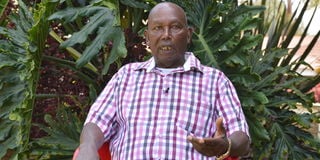Premium
Lee Njiru: Mwai Kibaki was a gentleman surrounded by 'evil' people

Lee Njiru, former president Daniel arap Moi’s press secretary speaks at his Ngata home in Nakuru County on April 27, 2022.
A top aide of Kenya’s second President Daniel arap Moi has described the late Mwai Kibaki as a gentleman who was surrounded by ‘evil’ people.
Mr Njiru, who served as head of the Presidential Press Unit during the late Moi’s government, recounted to the Nation the embarrassment, threats, intimidation and insults he received even before Kibaki, who was laid to rest in Nyeri County yesterday, was sworn into office in 2002.
"While the late President Kibaki understood people, some people close to him were ‘evil’," said Mr Njiru.
He revealed that he got telephone calls from people telling him to pack his bags even before the swearing-in of President Kibaki.
"Ten people came to State House and were even jostling in the office of the Comptroller of State House. Many others were eyeing my position," Mr Njiru said.
Death threats
He continued: "We were being referred to as FR – former regime. I got messages that I would go to jail."
"I received death threats. When I left the office, I was given 24 hours to vacate a government house near State House Nakuru. I was told those orders were given by President Kibaki. I knew those were lies since Mr Kibaki was unwell."
"Those around Mzee Kibaki used his name to terrorise and insult people," he added.
He said the threats targeted government officials who were perceived to be close to President Moi.
"I waited for one year, until Mzee Kibaki signed the Presidential Retirement Benefit Act into Law in Mombasa in 2003, to get allowances. Some people wanted to inflict maximum physical and psychological injuries on us," the former PPU boss said.
He further said that the "evil" people went behind Kibaki's back and started sacking some top Kenya Defence Forces officers.
Sacked officers
"They sacked General Lazarus Sumbeiywo, who was the Army Commander, General Simon Mutai, who was the Commander of the Kenya Air force, the late Major General John Serem, Dr Sally Kosgei, Secretary to the Cabinet and Head of Public Service, Mr Aron Tuikong, among others," he said.
"This was the work of people who believed the officers were Moi's people," Mr Njiru, 73, explained, adding that not all the sacked officers were Moi’s allies.
"Senior army officers like General Sumbeiywo, General Mutai and General Serem were employed by the late Mzee Jomo Kenyatta in the 1970s. They were not employed by Mzee Moi," said Mr Njiru.
He observed that when the Shifta war began in the early 1960s, Mzee Kenyatta wanted to recruit many young people to fight the Shifta war.
"Most of the Kikuyu young men then did not join the army as they had come from detention and were tired of battles. They had battled the white colonists during the Mau Mau war and did not want to continue fighting," explained Mr Njiru.
Moi ascended to power
He said this paved the way for the Kalenjin and Maasai communities to join the army and when Mzee Moi ascended to power, he continued working with the officers.
"These were Kenyan soldiers. They were members of the Kenya Defence Forces," he said.
He explained that the Kalenjin communities migrated to ODM ahead of the 2007 General Election in large numbers to express their anger at how their people in the government were sacked.
"The Kalenjin nation did not join ODM because they loved the Orange party. They were expressing their anger and disapproval of the sacking of senior army officers by people who surrounded Kibaki. They had nothing against Kibaki," he said.
He cited the case of Dr Kosgei, who cried in the open when she was sacked in 2002.
"This was one of the first women from Nandi to go to Stanford University. Is it not ridiculous to go and ask for votes from the same people whose daughter you have sacked?"
Mr Njiru said the problem with Kenyan leadership is that most leaders do not understand sensitivities around communities.
"If you're a leader, you must know the communities you're addressing as they have their lines of thought," he explained, adding that the mishandling of the transition by people close to Kibaki could have contributed to the 2007/8 post-election violence.





